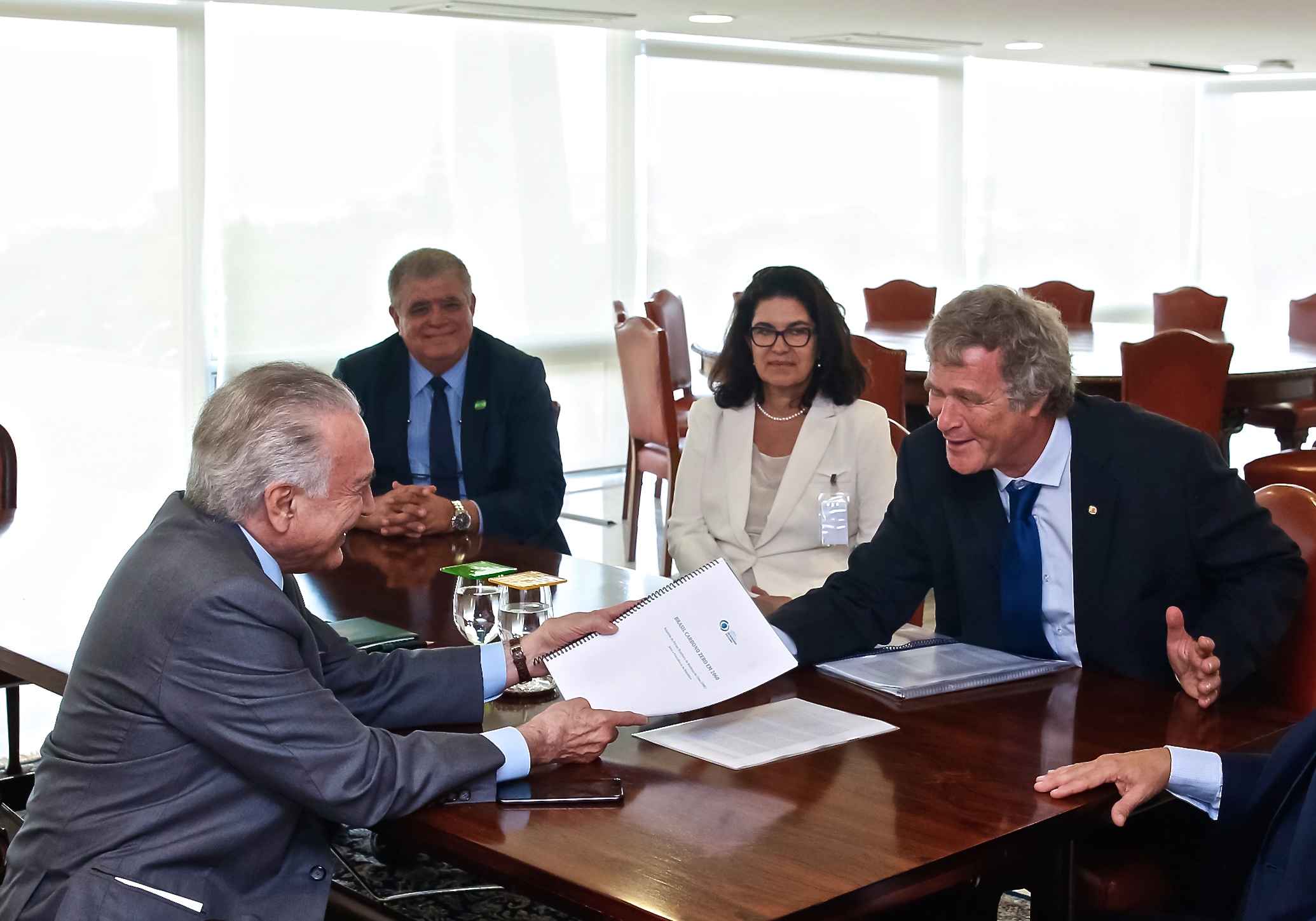Accessibility Tools
 O encontro pretende mostrar alguns desafios e ações desenvolvidas para mitigar os efeitos das mudanças do clima
O encontro pretende mostrar alguns desafios e ações desenvolvidas para mitigar os efeitos das mudanças do clima
Apresentar alguns dos problemas, avanços e desafios do estado, propor investimentos no setor de energias renováveis além de discutir a experiência de um dos países mais avançados em investimentos em energia limpa e conhecer suas ações no setor de adaptação às mudanças do clima e as novas tecnologias de baixo carbono. Essas são algumas propostas do “Seminário: Mudanças do Clima e Energias Renováveis”, que será realizado pelo Governo de Pernambuco, por meio das secretarias Estaduais de Meio Ambiente e Sustentabilidade (Semas/PE), Infraestrutura e Recursos Hídricos e Desenvolvimento Econômico, em parceria com Consulado Geral da China em Recife. O seminário acontece no dia 24 de abril, no Auditório do Banco Central do Brasil, no bairro de Santo Amaro.
O encontro contará com a presença de uma comitiva da Província de Qinghai, entre eles o vice-govenador, Wang Liming, além de um grupo de representantes das principais empresas chinesas do setor de energias renováveis. A ideia é estreitar as relações entre o Estado de Pernambuco e a China, assim como, compartilhar experiências no campo de políticas de baixo carbono, energia renovável e setores relacionados. A iniciativa é também uma oportunidade de apresentar o potencial de investimentos no setor de energia em Pernambuco e no arquipélago de Fernando de Noronha. Além disso, o evento contará com a presença do Prof°. Dr°. Emílio Lèbre La Rovere, coordernador do Centro Clima, que apresentará a conferência de abertura do evento.
Os desafios com relação às mudanças climáticas já fazem parte das ações do Governo de Pernambuco, que em 2015 instituiu o Programa Pernambucano de Micro e Minigeração de Energia Solar (PE Solar). O programa visa estimular e fomentar o mercado fornecedor de equipamentos e serviços para a indústria de energia solar. Também busca incentivar a criação de empresas locais para a instalar este tipo de sistemas solar em instalações para pessoa física e jurídica em todo o Estado.
A China está entre os maiores produtores e consumidores de energia do mundo. Apesar de ser o maior emissor de gases do efeito estufa (GEE), sendo o carvão a principal fonte energética, o país asiático é um dos que mais investe em energia limpa do planeta, tendo a maior capacidade instalada de energia eólica. Eles também exportam painéis solares fotovoltaicos para todo o mundo.
Entre as apresentações do seminário estão o Panorama da Política das Mudanças Climáticas e as contribuições do setor de energia no Brasil; o Plano estadual de Mudanças Climáticas de Pernambuco, suas contribuições, avanços e desafios; os Desafios da Transposição do Rio São Francisco; Florestas Energéticas, mais uma alternativa no cenário das Energias Renováveis, entre outras.
Serviço: Seminário: Mudanças do Clima e Energias Renováveis
Data e horário: 24 de Abril de 2019 - 8:30h às 17:30h
Local: Auditório do Banco Central do Brasil, na Rua da Aurora , nº 1259 - Bairro de Santo Amaro.
Clique AQUI para se inscrever.
Clique AQUI para mais informações.

Publication in Nature Climate Change
Every country must have a long-term strategy for climate change, otherwise the Paris pledges will come to nothing — the Deep Decarbonization Pathways (DDP) network proposes a handbook to build their strategies.
The DDP network publishes a paper in Nature Climate Change showing how the research it has undertaken can help organize cross-society debates about climate change, take decisions to align countries’ actions with climate science, and build public support for the policies and measures needed.
The Deep Decarbonization Pathways (DDP) is a group of research teams formed in 2014 to build and discuss national long-term strategies compatible with ambitious climate objectives. It operates today in almost 40 countries, under the coordination of the Institute for Sustainable Development and International Relations (IDDRI.org).
Henri Waisman, lead for DDP initiative at IDDRI, first author of the paper, says: “In all the countries we have analysed, we have demonstrated that it is possible to achieve “deep decarbonization” by 2050, and to do so in a way that meets each country’s socio-economic priorities. Based on lessons learnt from this scientific work, this paper describes our framework for pathway design, which could be widely adopted by countries developing their strategies to meet global climate goals.”
The DDP research responds to the new policy making agenda set out in the Paris Climate Agreement which requires countries to formulate “long-term low greenhouse gas emission development strategies” (cf. Art 4.19) consistent with global greenhouse gas emission neutrality as early as possible in the second half of the 21st century. The DDP pathway design framework ensures that these strategies reflect country circumstances and national development objectives and can be useful for stakeholder and policy engagement.
Laurence Tubiana, CEO of the European Climate Foundation, said: “The Deep Decarbonization Pathways teams have done a remarkable job ahead of the Paris Agreement and since then, showing the opportunities of a low-carbon future for individual countries and highlighting the value of international cooperation”.
For Valérie Masson-Delmotte, IPCC co-chair: “The work of the Deep Decarbonization Pathways network complements and reinforces the assessment of the IPCC Special report on “Global Warming of 1.5°C”. It shows how to build concretely, in different national contexts, strategies towards zero emissions that go hand-in-hand with sustainable development.”
How can each country, region, city or private firm justify that their existing emissions mitigation targets, strategies and actions are “aligned with climate science”? How should each dimension of the society transform and how do these transformations interact with each other? What actions and policies should be implemented immediately in order to trigger the required transformations over time? Under which conditions can deep decarbonization support the sustainable development agenda and be aligned with socio-economic priorities, as self-defined by countries, regions and cities? The DDP approach can provide a basis for societies to debate all these fundamental questions, for reaching a shared assessment about the targets and policies that are truly aligned with the science of climate change and therefore for responding to the call for concrete and efficient climate action.
Access to the paper, on Nature Climate Change website HERE.
 A partir de março de 2019 ocorrerá a Pós-Graduação em Gestão sustentável de Energia da EUREM. O Prof. Emílio La Rovere será o docente responsável pelo módulo "Comércio de Emissões".
A partir de março de 2019 ocorrerá a Pós-Graduação em Gestão sustentável de Energia da EUREM. O Prof. Emílio La Rovere será o docente responsável pelo módulo "Comércio de Emissões".
A Câmara de Comércio e Indústria Brasil-Alemanha do Rio de Janeiro (AHK Rio), em parceria com o Programa de Planejamento Energético da COPPE/UFRJ, oferecem o curso de Pós-graduação em Gestão Sustentável de Energia – European EnergyManager (EUREM). O EUREM é um treinamento padronizado de educação continuada, oferecido em 33 países e formando uma rede com mais de 5.200 EnergyManagers. Para concluir o curso, é requerida a elaboração do projeto Energy Concept, com o objetivo de implementar ações de eficiência energética para o setor industrial. Os participantes bem-sucedidos receberão um certificado de MBA, emitido pela COPPE/UFRJ, assim como um certificado internacional emitido pela AHK-RJ juntamente com IHK-Nürnberg.
Para mais informações clique AQUI.

The Carbon Pricing Leadership Coalition (CPLC) and the World Bank Group are hosting the world's first International Research Conference on Carbon Pricing on February 14-15 in New Delhi, India. The event is convening over 30 researchers from across the globe to present papers on various carbon pricing themes. These papers have been selected through a review process by an international scientific committee comprising of academics, researchers, and policymakers. The two-day Conference will host over 300 participants and be centered around six central themes: (1) Learning from Experience, (2) Carbon Pricing Design, (3) Concepts and Methods, (4) Political Economy, (5) Decarbonizing the Economy, and (6) Emerging Frontiers. Each day will feature plenary sessions with leading experts, followed by concurrent sessions covering the six themes.
To further understand the evolving challenges to successful carbon pricing implementation and identify areas of future research, the CPLC welcomes scientists, researchers, practitioners, advocates and policymakers to take stock of the carbon pricing knowledge base and strengthen understanding of emerging trends in carbon pricing.
Powerful policies are needed to achieve the large-scale emission reductions required under the Paris Agreement. Putting a price on carbon pollution is one of the most potent and efficient strategies governments and corporates can use to reduce carbon emissions and combat climate change. 88 countries are considering use of carbon pricing initiatives as part of their Nationally Determined Contributions (NDCs). To support these developments, research and analysis will be vital for effective carbon pricing design and implementation. The CPLC Research Conference will explore the existing carbon pricing knowledge base and foster an improved understanding of the evolving challenges to successful carbon pricing implementation. The research from both modeling carbon pricing approaches and their real-world implementation will help bridge the gap between theory and practice and inform future decisions taken by policymakers and corporate leaders.
Further information HERE
 O Coordenador Executivo do Fórum Brasileiro de Mudança do Clima - FBMC, Alfredo Sirkis, juntamente com o Ministro do Meio Ambiente, Edson Duarte, e a representante do Centro Clima/COPPE/UFRJ, pesquisadora Carolina Dubeux, foram recebidos no dia 27/12, em audiência, pelo presidente Michel Temer para a entrega do relatório de avaliação preliminar do caminho para um "Brasil Carbono Zero em 2060" que ele encomendara ao Fórum, em setembro, para realização pelo Fórum em um prazo de 120 dias. Neste período, a equipe do Centro Clima realizou o estudo que foi em seguida discutido e validado pela Câmara Técnica de Longo Prazo do FBMC.
O Coordenador Executivo do Fórum Brasileiro de Mudança do Clima - FBMC, Alfredo Sirkis, juntamente com o Ministro do Meio Ambiente, Edson Duarte, e a representante do Centro Clima/COPPE/UFRJ, pesquisadora Carolina Dubeux, foram recebidos no dia 27/12, em audiência, pelo presidente Michel Temer para a entrega do relatório de avaliação preliminar do caminho para um "Brasil Carbono Zero em 2060" que ele encomendara ao Fórum, em setembro, para realização pelo Fórum em um prazo de 120 dias. Neste período, a equipe do Centro Clima realizou o estudo que foi em seguida discutido e validado pela Câmara Técnica de Longo Prazo do FBMC.
"É um estudo preliminar de como o Brasil poderá chegar ao ano 2060 com emissões líquidas zero, contribuindo assim para a meta de 1,5 ºC, que recentemente foi mencionada pelo IPCC como aquela que previne efeitos mais catastróficos do aquecimento global", disse Sirkis.
Na ocasião também foi entregue o sumário "Mudança do Clima: riscos e oportunidades para o Brasil", decidido na última plenária do Fórum e destinado ao governo do futuro presidente Jair Bolsonaro. Nesse curto documento são resumidos os grandes riscos para o Brasil representados pelas mudanças climáticas, mas também as consideráveis oportunidades econômicas de uma política de baixo carbono, para a qual o país tem uma grande vantagem competitiva.
O Coordenador Executivo do Fórum solicitou ao Presidente que esclarecesse ao futuro governo que "o Fórum Brasileiro de Mudança do Clima conta com integrantes de governo, setor empresarial, setor acadêmico e terceiro setor e é uma instância plural de debates e formulações sobre a mudança do clima. É um instrumento de Estado mais do que de governo, que trata de um tema de logo prazo que ainda passará por muitos governos diferentes. A participação no Fórum é pro-bono, não há cargos comissionados ou despesa pública e a interlocução se dá com diversos ministérios e suas equipes técnicas. Conta com o prosseguimento desse processo sempre baseados na melhor ciência e no diálogo".
Confira aqui o Relatório Brasil Carbono Zero em 2060
Confira aqui o sumário Mudança do Clima: riscos e oportunidades para o Brasil
